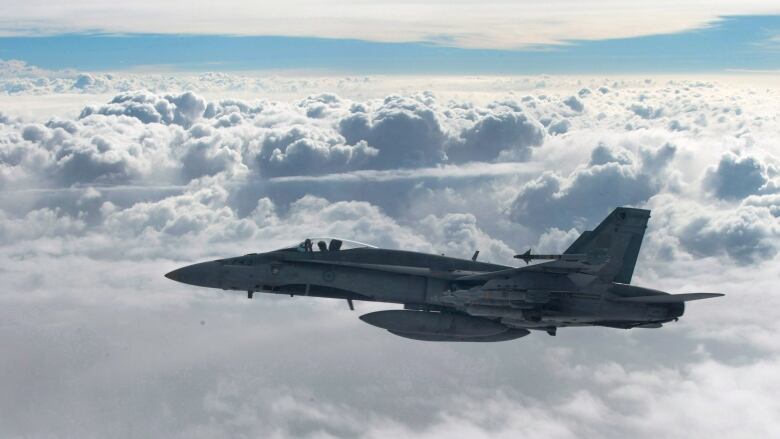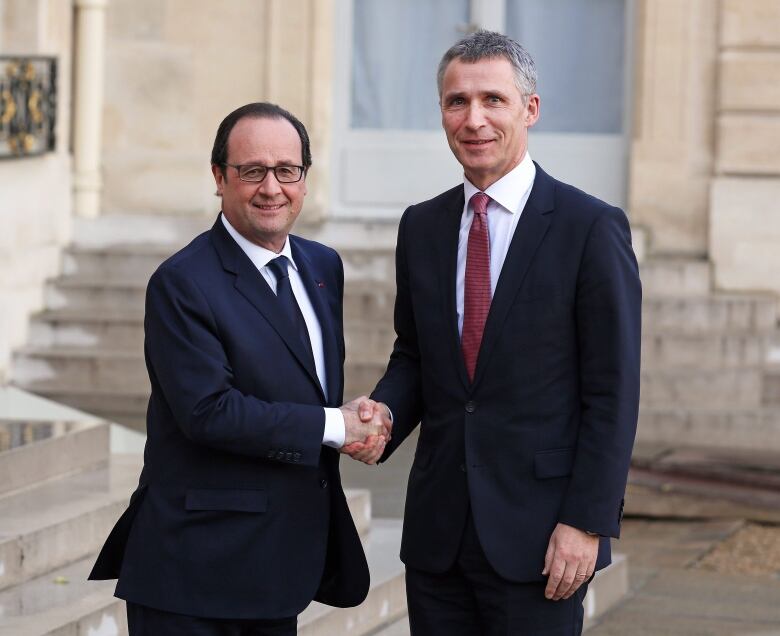NATO response to Paris attacks would not require Canada to act
Treaty states attack on 1 member is considered an attack on all

When French President Franois Hollande declared that thedeadlyattacks against Paris were an "act of war,"former Conservative defence minister Jason Kenneytweeted that thisdeclaration"hasimplications for Canada under theNATO Treaty's Article 5."
Kenney was referring to an article of the1949 North Atlantic Treaty, whichformed the foundation of the North American and European alliance.
According to Article 5, anattack on oneNATO memberis consideredan attack against them all. And it calls on the alliancemembers toassist the attacked countryby taking"such action as it deems necessary, including the use of armed force."
- France seeks global coalition against ISIS
- Just watch France: The new face of the war on terror
- After Paris, there will be no stopping the surveillance state
In practical terms, however, the 28 NATO members,includingCanada,would have no obligation to take any action.
"If Article 5 is invoked, it actually formally does not requireCanadato doanything," saidStephen Saideman, thePaterson Chair in International Affairs at Carleton University."Canadacan choose to do as little or as much as it wants."
"What it meansultimatelyis that Article 5 requires nothing from anybody.Everycountry canreactas they see fit. Countriesdon'thave toparticipate."
'A clarion call'
So if Trudeau is still set on withdrawing theCF-18s currently involved in the air bombing mission against ISIS in Iraq and Syria, Canada'sobligations to NATO would have no bearing onhis decision.
"Article 5 is a clarion call to draw attention and confirm solidarity, while the actual response might be much more uneven as a result of negotiation among NATO members," saidRobertBaines, a corporate development officer for theNATO Association of Canada.
"While Canada would not be obligated to take any specific action, there would be larger considerations of international relations with our NATO allies, and I'm sure we'd have to make some meaningful contributions to an Article 5 response," said Baines.

"Canada would be under a certain amount of pressure to participate meaningfully in a response to the attack, but there is no compulsion regardinghowwe respond."
Whether Article 5 willbe invoked is stillan open question. The only time it has been usedis after the Sept. 11, 2001,attacks.
France would first have to request anArticle 4 consultation. And it would be the North Atlantic Council, after consultations with representatives of the 28-member alliance, that would decide whether to invoke Article 5.
"Many bilateral and joint meetings among NATO members would be undertaken to negotiate the response before a united front would be displayed as an alliance," saidBaines."When Article 5 was invoked on Sept.12, 2001, it took almost a month to confirm the source of the attack and the response."
EU mutual defence clause
This week, France invoked the mutual defence clause of the European Union treaty, the first time a member country has done so. It too states that if a member state is attacked, other members are obliged to aid and assist. Butmuch like Article 5, it doesn't require military assistance.
A reluctance by Franceto call forNATO's help wouldnot be altogether surprising, as the country has a long history of ambivalence toward the organization, Saideman said.
From themid-1960s, thenpresident Charles DeGaullewantedFrance to forge an independent foreign policy andpulledout of NATO'soperational chain of command. While that changed under president NicolasSarkozy,who wanted France to play a larger role in NATO, it's unclear whether Hollandewants France to return to itstraditional relationship with NATO.
The main value of Article 5 would be to rally support and solidarity, and France already has that, said Baines, whodoubts France wouldseek out NATO to respond to the attacks.
"Many aspects of a NATO response have already begun to be made through pledges of military, intelligence and logistical support. Any augmented campaign in Iraq and Syria will almost certainly have to work in conjunction with Russian forces, and NATO involvement might not be the best option for that to work."
If Franceintended to invoke Article 5, those moves would have beenforeshadowedimmediately, saidAdam Chapnick, professor of defence studies at theCanadian Forces College.After the Sept. 11attacks, the Americans made it clear quickly that they intended to make the attacks an Article 5 issue.
Urgency passing
"France has had many opportunitiesto do that. They haven't yet," he said. "They didn't do it when the situationwas most urgent, which makes itless likely that they would do sonow, nor has any other NATO member suggested this shouldbe done."
"There have been pundits who have suggested[they do]so.But I haven'tseen anyofficialhead of governmentor official head of state come outand say we need to activate Article5 here."
As well, framing the French response as a NATO response potentially gives other states an excuse to do less, Chapnick said.
"If the Russians decided all of asuddenthis is a problem, wedon't wantto beinvolvedanymore, they have the out tosay this is a NATO issue, not a global issue," said Chapnick.
"I think it's in the West's interestsand France's interest toportray ISIS as having attacked the world. If it's only attacked NATO, that takes a lot of potential allies out of the picture.Idon't seewhatbenefityou gain fromframingthis as a NATOproblemrather than a global problem."












_(720p).jpg)


 OFFICIAL HD MUSIC VIDEO.jpg)
.jpg)



























































































